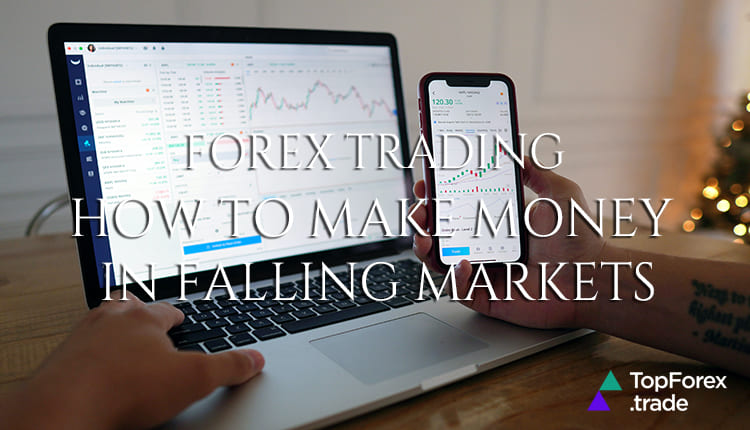Forex hedging: how to minimize trading losses

Hedging is a popular Forex trading strategy for those market players who want to minimize portfolio exposure as traders frequently use hedging to spread out their capital and maximize their profit potential. Hedging against unfavorable price movements lowers risk, and with numerous hedging strategies available, it’s definitely worth considering if you want to balance your portfolio.
Hedging can be both simple and complex as a trading strategy. In this article TopForex.trade experts will help you understand the concept of hedging and how to trade Forex and make a profit in both market directions.
Basics of Forex hedging
Hedging is the simultaneous purchase and sale of the same currency: while the trade is open, the net profit is zero, but if you time everything perfectly, you can actually make money with no additional risk. A basic Forex hedge protects your interests by allowing you to trade in the opposite direction without closing the first trade, allowing you to have both open at the same time. Some argue that it makes sense to close the first trade at a loss before entering a new trade in a better position, but this varies from trader to trader.
The hedge provides you with a benefit by letting you keep your deal open so that you can profit from a second trade as the price fluctuates against the first. If you assume that the market will reverse back in your favor, you can close or set the hedging trade to stop. It’s a simple analogy, but it’s like betting on both basketball teams to win: whatever happens, you’ll either make a profit or, at worst, incur a manageable loss.
Going short: how to profit when the market goes down

Choosing a short position represents a bearish trading viewpoint. When trading CFDs, a short position is when a trade is initiated by a sell order, which is considered more complex than going long.
Traders who share this viewpoint enter a trade (short) when the price is at its highest, hoping that it will fall. And the lower it falls, the more profit the bears stand to make. They push it down, opening up more and more new opportunities. When the prices reach their lowest point, bears earn profit.
When prices fall by more than 20% from their peak, it is customary to speak of the emergence of a bear market. The main driver of this event is the deterioration of the economic situation, which is accompanied by a decrease in the company and population profitability, rising unemployment, capital outflow, and other issues.
A prime example is the coronavirus pandemic. The implementation of bans and restrictive measures has had a negative impact on a large number of businesses around the world. Production ceased, demand for services fell, and mass layoffs ensued, but the bears made money in this environment.
Advanced Forex hedging instruments

There are numerous methods for hedging your trading deals, and from the simplest one described above, they can become more and more complex. And as many brokers do not allow traders to hold directly hedged positions in the same account, there are other tricks traders can use to secure their capital.
Trade Forex options
A put option grants the holder the right to sell a share at a predetermined price, known as the strike price, before a specified future expiration date. The premium is the amount of money you pay for an option.
A put option gains value as the underlying asset’s price falls. If the underlying’s price falls below the put option’s strike price, the trader can either exercise the right to sell the asset at a higher strike price or sell the put option for a profit.
Open a short sale
Selling short, also known as going short, is a trading strategy used by many market participants when prices are falling. With this strategy, you sell an asset in anticipation of a future price decline. When an asset’s price falls, you purchase it at a lower price to cover your short position and profit from the difference.
Consider this simple example: if you go short with N stocks borrowed from a broker at $50 per stock and the price drops to $30, you can buy back the stocks at $30 to cover your short position with your total earnings per stock at $20.
Choose CFDs for different assets
Traders can also use Contracts for Differences (CFDs), which allow market participants to sell short and increase their profits. They can be used to buy and sell a wide range of asset classes, such as stocks, ETFs, indices, or even Cryptocurrencies. They have nothing to do with trading the actual asset and are completely independent of the market due to an agreement between the trader and the CFD broker.
CFDs trading: way to make money on falling markets

CFDs have spawned a sophisticated trading strategy that is growing in popularity over time.
CFD is a contract entered into between a trader and a CFD broker to exchange the difference in the value of a financial asset (securities or derivatives) between the times the contract opens and closes. They can be traded in shares, currency pairs, commodities, bonds, stocks, or indices and are an appealing way to trade global markets without committing to a specific asset.
CFDs do not include the delivery of tangible items or securities, and the buyer never truly owns the underlying asset; instead, he or she earns profit based on the asset’s price fluctuation.
Essentially, CFDs allow traders to wager on whether the price of the underlying asset or security will rise or decline: they can place bets on either up or down movement. If the trader who purchased a CFD notices that the asset’s price rises, they will offer their position for sale. The net difference between the buy and sale prices is added together. The trader’s brokerage account settles the net difference representing the gain from the deals.
As you may already conclude, CFDs trading bears a number of substantial benefits:
- Profit from falling markets: again, the fundamental difference between CFDs and regular trading is that you never own the underlying market with CFDs, which provides several benefits, including the ability to go both short and long. To open a short CFD position, you sell the desired number of contracts rather than purchasing them. You simply purchase the same number of CFDs to close your trade. It enables you to profit when markets fall in price, giving your trading a whole new dimension.
- Multiple trading possibilities: CFDs on stocks, indices, shares, currencies, bonds, and commodities are currently available from brokers. Speculators interested in various financial vehicles can now trade CFDs as an alternative to traditional exchanges.
- Absence of day trading limitations: Some markets require a minimum amount of capital to day-trade, while others limit the number of trades that can be made in a given account. These restrictions do not apply to the CFD market as all account holders can day-trade. Accounts are frequently opened for as little as $1000 or even less, then minimum deposit requirements usually range between $2000 and $5000.
- No shorting rules: Certain markets prohibit shorting, require traders to borrow the instrument before selling short, or have different margin requirements for long and short positions. CFD instruments can be shorted at any time without incurring borrowing charges because the trader does not own the underlying asset.
- CFDs can be traded with leverage: CFDs offer more leverage than traditional trading, still being regulated by global market authorities. It used to be as low as a 2% maintenance margin (50:1 leverage), but it is now limited to 3% (30:1 leverage) and may go up to 50% (2:1 leverage). Lower margin requirements imply less capital outlay and higher potential rewards for the trader (also higher potential losses, so make sure to hedge or use other trading risk management strategies).
Passive Forex income with Social trading

If your head is buzzing with all the information you have to keep in order to develop your own trading strategy, there is an easier option: leave it to professionals. The Forex market offers numerous options for generating passive income, making it a profitable environment for newcomers.
The options listed below may help novices who have little experience in trading make money and learn:
Copy Trading
Copy trading is a great option for people who are just starting out in Forex trading. By automating your deals and imitating the moves of other experienced traders, you can increase your chances of success as you follow their trades. All earnings are yours to retain, and you endure losses in proportion to your financial deposits. Professional traders also have the possibility to receive additional financial benefits if their profitable transactions were copied.
PAMM accounts
Through a process known as Percentage Allocation Money Management or PAMM, two or more investors can distribute money to a qualified trader or money manager in specific ratios. At the end of the trade, the trader or money manager paid the investors the transaction profit.
RAMM, or Risk Allocation Management Model, is a hybrid that includes elements of both Copy trading and PAMM. By allowing them to use tried-and-true strategies, RAMM helps new traders trade more profitably and efficiently.
Forex signal providers
Not exactly a passive income source, but a great help for your trading decisions. Forex signal providers are computer programs that assist you in detecting trading opportunities at specific times. They are an amazing fit for beginners as they direct you on how to make the best trading decisions.
5 Forex trading tips on how to avoid losing money

The global Forex market is the world’s largest financial market, and the opportunity to profit from it entices foreign-exchange traders of all levels, from newcomers learning about financial markets to seasoned professionals with years of trading experience.
Because access to the market is simple—with round-the-clock sessions, significant leverage, and low costs—many Forex traders enter the market quickly, only to exit quickly after suffering losses and setbacks. To avoid that, TopForex.trade experts have brought 5 not obvious tips to help to aspire traders avoid losing money and stay competitive in the world of Forex trading.
- The market study is necessary
To make real profits, you can’t treat Forex trading as a way to make quick easy money (if your broker promises you that, check whether it is a Forex scam or not). While practical experience provides the majority of trading knowledge, a trader should learn everything about the markets, including main indicators, trading signals, and geopolitical and economic factors that affect a trader’s preferred currencies meaning employing Technical, Fundamental analysis and following the latest market-relevant news.
- Pick only regulated brokers (!)
As the Forex industry is growing in popularity and volume, not all its participants have honorable intentions in mind: unfortunately, you may come across shady brokers that are nothing more than a scam.
Each country has its own regulatory body that legitimate Forex brokers must register with. Traders should also look into each broker’s account options like offered leverage, commissions and spreads, initial deposits, and account funding and withdrawal policies. A helpful customer service representative should have the information and can answer any questions about the company’s services and policies.
If you have any doubts about your broker, evaluate it by the criteria mentioned here.
- Practice on a demo account first
Forex trading demo accounts are provided by the most reliable brokers as they are interested in your long-term successful trading. This type of account allows traders to place hypothetical deals in a realistic market environment without using a funded account and risking their real capital.
Aside from gaining more experience, practicing on a demo account first has one more huge benefit: it allows a trader to get acquainted with a new trading platform and become proficient in order-entry techniques. Few things are more damaging to a trading account (and a trader’s confidence) than accidentally opening or closing a position. It is not uncommon for a new trader, for example, to add to a losing position instead of closing it. Multiple order entry errors can result in large, unprotected losing trades.
- Don’t overuse automatic signals
When you just start trading, it may be tempting to use all of the Technical analysis tools available on the trading platform thinking it’ll definitely help to make better deals. And while many of these indicators are well-suited to the Forex markets, it is important to remember that in order for them to be effective, these analysis techniques should be kept to a minimum. Using multiples of the same type of indicators (like two volatility indicators or two oscillators) can become redundant and even produce contradictory signals.
Pay attention to the overall appearance of the workspace in addition to the tools used on the chart: they should be simple to read and understand thanks to the selection of colors, typefaces, and price bar types (line, candle bar, range bar, etc.). This will help you to react more quickly to ever-changing market conditions.
- Keep trading records
Journaling your trading experience is a useful way for learning from both Forex trading failures and gains. In order to develop into a successful trader, it can be very helpful to keep a record of trading activity that includes dates, instruments, gains, losses, and, perhaps most importantly, your own performance and emotions.
A trade journal offers valuable feedback that enables learning when it is periodically reviewed. Without keeping good records and keeping a trading log, you are more likely to keep making the same mistakes, which lowers your chances of becoming a successful trader.
Secure Forex trading with VPN

Best VPN services for Forex trading are strongly advised for safe and private asset trading in any kind of market. VPNs allow you to reroute your traffic at will through one or more locations, so you will always be protected from government surveillance or any intruders. Furthermore, cutting-edge military-grade encryption algorithms will keep your personal information from leaking onto the Internet.
Click the button below to register with one of the best VPNs for Forex trading:
A VPN also allows you to remain anonymous, meaning that your online activity and data cannot be tracked, collected, or stored, which is common when using the Internet. This gives you a sense of security and reassurance, as well as lowering your chances of becoming a victim of hackers and other types of cyber-attacks and criminal activity that could compromise your personal information, such as your password.
Best Forex brokers to hedge your capital
The main goal of hedging deals is to reduce your trading risk. It can be done carefully and become an important part of your trading strategy, effectively allowing you to make money in both directions. Yet, it requires a certain level of knowledge and market experience: as you are now aware, hedging places a strong emphasis on timing as well as understanding the ins and outs of market swings. If you’re a complete trading newbie, you can seek the help of professional traders using the Social (Copy) trading feature provided by trusted brokers reviewed by our experts below.
Also, you can make your approach more professional by opening accounts with several reputable brokers and differentiating your trading activity: make deals yourself with one broker, use Social trading with the other, and appoint the third one for hedging. It’ll help you to distribute your capital to mitigate possible risks; another advantage of this approach is that you can try out trading on several trading platforms and collect offered Forex bonuses (some brokers have it up to 100% on the initial deposit).
OANDA Forex trading
OANDA, a reputable broker that is also present in the US with millions of clients worldwide and a long history of operations, has earned a stellar reputation among users while also complying with a slew of global regulators.
As it offers demo accounts, extensive educational tools, and market information, and there is no minimum deposit requirement, the broker is an excellent choice for new traders. Brokers frequently run promotional campaigns in which they offer various Forex bonuses as well as low commissions and spreads, as well as a diverse range of trading instruments such as CFDs on over 70 currency pairs, Indices, Commodities, and Crypto including Bitcoin and Ether.
eToro Forex trading
eToro is one of the world’s most well-known brokerage companies, especially loves in Europe. You can invest in over 2000 different assets, including CFDs on currencies, commodities, indices, equities, and Cryptocurrencies, with the best available terms: minimal Forex trading costs and minimum deposits. New digital currencies such as Bitcoin, Ethereum, and others have been added to the list of trading instruments since 2017.
eToro has two account types: Retail Client and Professional Client. The first is protected from negative balance and has a Copy Trading feature, whereas the second has the maximum leverage of 1:400. Additionally, newcomers can always use a demo account to experiment with and try out new strategies.
eToro is a very reliable broker with millions of clients worldwide, as well as licenses to operate in numerous countries and membership in the following regulators: FCA, ASIC, and CySEC.
XM Group Forex trading
XM Group is a regulated online broker that provides over 1000 trading instruments on the MT4/MT5 platforms, including CFDs for Crypto (Bitcoin, Ethereum, Ripple), indices, commodities, metals, energy, and stocks (other 600 companies). In addition, the broker provides an easy-to-use mobile app that allows you to trade on global markets using a single login on a demo or live account.
Furthermore, XM offers a VPS service, allowing clients to fully enjoy all of the benefits of trading without having to worry about other issues that can impede fast and high-quality transactions, such as Internet connection speed, computer problems, and power outages.
One of the many benefits of XM Group is that there are no fees for deposits or withdrawals: the broker covers the entire cost of the payment system. From the following alternatives, clients can choose the most profitable trading account with negative balance protection, good leverage, and tight spreads: Micro, Standard, XM Ultra Low, and Shares.
XG Group accepts clients from over 150 countries thanks to accreditation from recognized regulators such as CySEC, IFSC, DFSA, and ASIC.
HF Markets Forex trading
HF Markets, formerly known as HotForex in some regions, is a broker with offices around the world that offers the most diverse range of trading instruments, including CFDs for over 1000 instruments such as currency pairs, commodities, Cryptocurrency, stocks, indices, metals, energies, bonds, and, most notably, Forex Gold trading with competitive low spreads and no hidden fees.
HF Markets clients can choose between Micro, Premium, Zero Spread, Demo, and Islamic trading accounts. Copy Trading HFcopy, which allows you to mirror transactions from multiple traders at the same time, is also available.
All transactions take place across multiple platforms. Options include MT4, MetaTrader 4 Web Terminal, and mobile trading apps for Apple and iOS devices. The broker holds licenses from CySEC and the FCA (Europe), the FSCA (South Africa), and the DIFC (Dubai).
Hedging Forex trading - FAQ